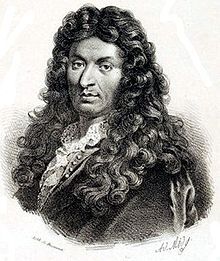November 26, 2018. Lully, Donizetti, Callas. Jean-Baptiste Lully was born this week, on November 28th of 1632. He’s the first of the great French Baroque composers – Couperin and Rameau followed, each a generation younger. When Lully was accepted at the court of Louis  XIV, first as a dancer, then as composer, French music was in a temporary decline. The Italians were way ahead, developing the new Baroque style: Monteverdi, the “father” of the opera, was one of the very first to cross the line between Renaissance and Baroque; Girolamo Frescobaldi adapted the new style to his music for the clavier; Giacomo Carissimi, Tarquinio Merula and Salamone Rossi were among the early adopters. Francesco Cavalli and Antonio Cesti followed Monteverdi in the development of opera. There were many more – Italy was bursting with musical talent. The French just couldn’t compare – that’s till Lully, an Italian who took French citizenship once the King gave him the most important music position in the realm, that of the surintendant de la musique de la chambre du roi, the superintendent – the manager and organizer – of music in the King’s chambers. And at the court, Lully was really in charge of everything music-related. He had two composers working for him, supervised several ensembles, including the famous Twenty-Four Violins of the King, and other musicians. He also composed. In 1664 he met Molière, with whom he created several comédies-ballets. Most of them were premiered at the court and then played in Paris theaters. Lully even became known in Italy: the Grand Duke of Tuscany asked him to write several dances in the “fashionable style.” All this work brought Lully a lot of money, and in 1670 be built himself a splendid house on the corner of rue Sainte-Anne and rue des Petits Champs (the house was so expensive that he still had to borrow 11,000 livres from Molière). The building still exists. Here’s a short Prelude to Psyché, a play by Molière. William Christie conducts Les Arts Florissants.
XIV, first as a dancer, then as composer, French music was in a temporary decline. The Italians were way ahead, developing the new Baroque style: Monteverdi, the “father” of the opera, was one of the very first to cross the line between Renaissance and Baroque; Girolamo Frescobaldi adapted the new style to his music for the clavier; Giacomo Carissimi, Tarquinio Merula and Salamone Rossi were among the early adopters. Francesco Cavalli and Antonio Cesti followed Monteverdi in the development of opera. There were many more – Italy was bursting with musical talent. The French just couldn’t compare – that’s till Lully, an Italian who took French citizenship once the King gave him the most important music position in the realm, that of the surintendant de la musique de la chambre du roi, the superintendent – the manager and organizer – of music in the King’s chambers. And at the court, Lully was really in charge of everything music-related. He had two composers working for him, supervised several ensembles, including the famous Twenty-Four Violins of the King, and other musicians. He also composed. In 1664 he met Molière, with whom he created several comédies-ballets. Most of them were premiered at the court and then played in Paris theaters. Lully even became known in Italy: the Grand Duke of Tuscany asked him to write several dances in the “fashionable style.” All this work brought Lully a lot of money, and in 1670 be built himself a splendid house on the corner of rue Sainte-Anne and rue des Petits Champs (the house was so expensive that he still had to borrow 11,000 livres from Molière). The building still exists. Here’s a short Prelude to Psyché, a play by Molière. William Christie conducts Les Arts Florissants.
Gaetano Donizetti was born on November 29th of 1797 in Bergamo. He studied in a local school established by a German opera composer Simon Mayr, who moved to Bergamo and was appointed the maestro di cappella at the Cathedral of Bergamo. Gaetano was one of Mayr’s favorite pupils, and Mayr even secured a scholarship for him to study in Bologna. In 1821 Donizetti, a fledgling composer, moved to Rome. There he wrote hist first successful opera, Zoraida. A year later he moved to Naples and stayed there for 16 years. It was during that period that he wrote most of his masterpieces. The first was Anna Bolena, written in 1830. It premiered in Milan, in Teatro Carcano; the success was overwhelming. Giuditta Pasta sung the title role. Pasta, a mezzo who sung soprano roles, one of the greatest singers of her time (Bellini wrote the role of Norma with her in mind). Nowadays, musicologists compare her to Maria Callas. It just so happens that Maria Callas’s birthday is also this week! She was born on December 2nd of 1923 in New York to Greek parents. Here’s an outstanding performance by Callas in the Mad Scene from Anna Bolena. In the 20th century Donizetti’s masterpiece was almost forgotten, partly because the main role is so demanding; Pasta brought Anna Bolena to life, Callas’s performance at La Scala in 1957 helped to revive it. In this studio recording, made one year later in London, Nicola Rescigno is conducting the Philharmonia Orchestra. We can only guess if Giuditta Pasta was as good.
| Source: | https://www.classicalconnect.com/node/12796 |
| Website: | Classical Connect |